- ON THE DECADE
- THE DECADE'S CAMPAIGN
- REPORTING ON PROGRESS
- THE DECADE'S PROGRAMMES
- FOCUS AREAS
-
- Access to sanitation
- Financing water
- Gender and water
- Human right to water
- Integrated Water Resources Management
- Transboundary waters
- Water and cities
- Water and energy
- Water and food security
- Water and sustainable development
- Water and the green economy
- Water cooperation
- Water quality
- Water scarcity
- FOCUS REGIONS
- RESOURCES FOR
- UN e-RESOURCES
‘Water for Life’ UN-Water Best Practices Award: 2011 edition: Finalists
Category 1
Siruthuli. Artificial Groundwater Recharge through Roadside and Open space Rain Water Harvesting Structures in Coimbatore city, India
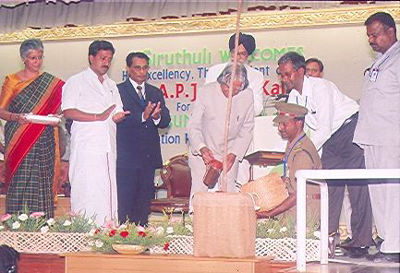 Due to over-use and mismanagement, the underground water scenario of Coimbatore region has been oscillating widely, which saw Coimbatore declared as a drought-prone District by the UNDP in the 1980s itself. The years 2002 and 2003 saw the water situation at its worst, with the underground water tables as low as 1000 feet and highly polluted. Even the regular drinking water supply got affected. Siruthuli, an NGO based in Coimbatore, implemented various water harvesting methods such as desiltation/standardization of tanks and anicuts, creation of new water bodies, construction of rainwater harvesting structures and river restoration that facilitates water percolation in order to enrich the water table. All these activities received its due recognition when the water table level improved to 30 feet.
Due to over-use and mismanagement, the underground water scenario of Coimbatore region has been oscillating widely, which saw Coimbatore declared as a drought-prone District by the UNDP in the 1980s itself. The years 2002 and 2003 saw the water situation at its worst, with the underground water tables as low as 1000 feet and highly polluted. Even the regular drinking water supply got affected. Siruthuli, an NGO based in Coimbatore, implemented various water harvesting methods such as desiltation/standardization of tanks and anicuts, creation of new water bodies, construction of rainwater harvesting structures and river restoration that facilitates water percolation in order to enrich the water table. All these activities received its due recognition when the water table level improved to 30 feet.
Rapid industrialization resulted in constant decrease in lung spaces and green belt. To address this problem, “Pasumai Payanam” was launched by the then President of India Dr APJ Abdul Kalam. The project aims to plant and nurture 1.5 million saplings in Coimbatore, thus ensuring 1 tree for each of its 1.5 million citizens. A Tree Park has been established which stocks at least 50,000 saplings at any given point of time for distribution to public. So far, 0.3 million saplings have been planted in and around Coimbatore.
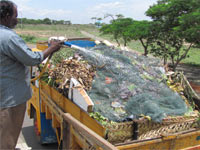 Coimbatore city alone generates 600 tonnes of garbage everyday, which is being dumped at the Vellalore garbage yard without segregation and treatment. Flies, mosquitoes and other insects thrive excessively on this accumulated waste causing menace and health risks to the public. Siruthuli introduced spraying of Effective Micro-Organisms Solution (EM Solution) and sprayed it over the accumulated as well as fresh waste and over the sewage water lagoon too. In due course, the quantity of the waste decreased tremendously, due to the catalyzing effect of the microbes in decomposing. Siruthuli also plants and maintains saplings in the garbage yard to reduce air pollution and bad odor.
Coimbatore city alone generates 600 tonnes of garbage everyday, which is being dumped at the Vellalore garbage yard without segregation and treatment. Flies, mosquitoes and other insects thrive excessively on this accumulated waste causing menace and health risks to the public. Siruthuli introduced spraying of Effective Micro-Organisms Solution (EM Solution) and sprayed it over the accumulated as well as fresh waste and over the sewage water lagoon too. In due course, the quantity of the waste decreased tremendously, due to the catalyzing effect of the microbes in decomposing. Siruthuli also plants and maintains saplings in the garbage yard to reduce air pollution and bad odor.
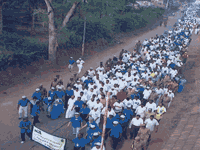 In order to ensure sustainability of the activities done, participation of the community was ensured through the formation of Beneficiary Forums, Farmers’ Cell and School Forums. Also Awareness Programmes and Fund Raising Programmes are being conducted at least once a year, involving eminent personalities in order to pass the message of environmental well-being to the general public. Siruthuli has now almost 2000 active volunteers who help to spread a culture of environmental responsibility among the students.
In order to ensure sustainability of the activities done, participation of the community was ensured through the formation of Beneficiary Forums, Farmers’ Cell and School Forums. Also Awareness Programmes and Fund Raising Programmes are being conducted at least once a year, involving eminent personalities in order to pass the message of environmental well-being to the general public. Siruthuli has now almost 2000 active volunteers who help to spread a culture of environmental responsibility among the students.
>> More information about Siruthuli project [ – 94 KB]
– 94 KB]
>> Siruthuli website
Isla Urbana. Mexico City, Mexico
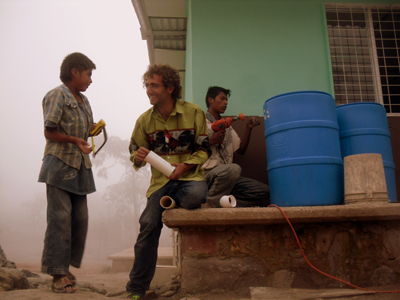 Isla Urbana, a project of the International Renewable Resources Institute (IRRI) Mexico, is dedicated to ensuring water security in urban areas through the adoption of rainwater harvesting (RWH) as an integral part of water management systems. Their multi-disciplinary team has designed an environmentally, socially, and economically sustainable rainwater harvesting system and implementation strategy.
Isla Urbana, a project of the International Renewable Resources Institute (IRRI) Mexico, is dedicated to ensuring water security in urban areas through the adoption of rainwater harvesting (RWH) as an integral part of water management systems. Their multi-disciplinary team has designed an environmentally, socially, and economically sustainable rainwater harvesting system and implementation strategy.
Mexico City, a mega-city combating a major water crisis, is where a replicable model of the project is being developed. Isla Urbana’s rainwater harvesting systems are promoting sustainable water management practices, mitigating the city’s flooding problems, relieving poverty, reducing carbon emissions, and providing a reliable source of water for the citizens of Mexico City.
Rainwater harvesting has been used by civilizations in Mexico for centuries; unfortunately, this ancient technology has been lost with the rise of modern water management systems. While the city suffers through major floods, these systems are unable to supply water to the 22 million people living in Mexico City. RWH offers a simple and effective solution to this inefficient system.
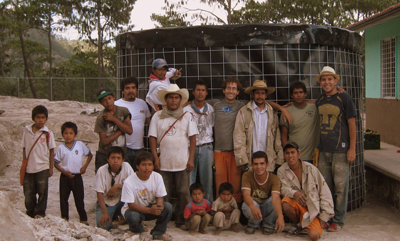 In Mexico City, as in many cities around the world, most of the components necessary for collecting rainwater currently exist as part of the infrastructure of individual buildings - cistern, pump, and header tank. Isla Urbana has designed a rainwater harvesting system that uses these existing components and installs gutters, downspouts, and three steps of purification to collect and clean rainwater for household use. These systems are low-cost, easy to install and maintain, and provide individual residences with about 50% of their water supply. They have developed a sustainable implementation process in a low-income water stressed region, called Ajusco Medio, which will be used as a model for replication throughout the city.
In Mexico City, as in many cities around the world, most of the components necessary for collecting rainwater currently exist as part of the infrastructure of individual buildings - cistern, pump, and header tank. Isla Urbana has designed a rainwater harvesting system that uses these existing components and installs gutters, downspouts, and three steps of purification to collect and clean rainwater for household use. These systems are low-cost, easy to install and maintain, and provide individual residences with about 50% of their water supply. They have developed a sustainable implementation process in a low-income water stressed region, called Ajusco Medio, which will be used as a model for replication throughout the city.
To ensure that the project is sustainable, they train and pay local personnel to install the systems, use local materials, and focus on educational and social service components. Isla Urbana work closely with families and community groups as well as with a variety of public and private institutions.
>> More information about Isla Urbana project [ – 218 KB]
– 218 KB]
>> Isla Urbana website
Category 2
Safe Water and AIDS Project – SWAP
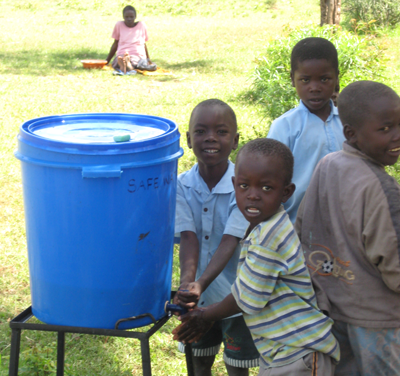 SWAP’s mission is to facilitate access to safe water, improve hygiene, reduce disease burden, and improve economic well-being among vulnerable populations in western Kenya.
SWAP’s mission is to facilitate access to safe water, improve hygiene, reduce disease burden, and improve economic well-being among vulnerable populations in western Kenya.
Nyanza Province has an HIV prevalence of 15%, the highest in Kenya. Nyanza Province also has the highest infant mortality rate -- 125 per 1000 live births -- and under five mortality rate -- 227 per 1000 live births – in the country. In 2004, life expectancy at birth was 38 years. Diarrhea and pneumonia alone count for over one third of all deaths in children under five years old and malaria accounts for an additional 14%. Only 63% of households in Nyanza Provinces have access to improved water supplies and 34% had adequate sanitation. The area is subject to floods and experiences recurrent cholera outbreaks.
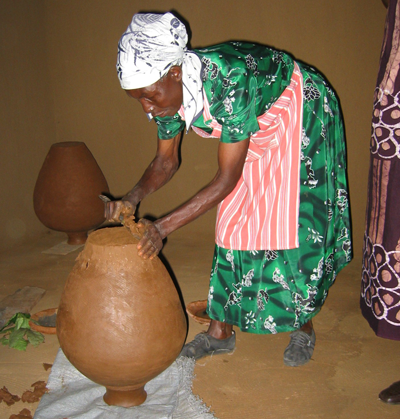 SWAP has introduced several products for water treatment that have been proven to improve water quality and prevent diarrhea. In addition, SWAP produces and sells improved water containers (ceramic and plastic) for safe storage that are fitted with lids and spigots. SWAP also sells two types of hand soap and metal stands upon which the improved storage containers can be placed to create a hand washing station. SWAP trainers have introduced safe water, hygiene, and a number of other health products to HIV support groups and other community self help groups. In 2007 SWAP established a partnership with Population Services International, a social marketing non-governmental organizations, that markets these products and provides them to SWAP at wholesale prices, which self-help groups then sell to community members at the retail price, keeping the difference as an incentive. SWAP collaborates closely with a number of partners, including the Ministry of Public Health and Sanitation,
community leaders, local and international NGOs, UNICEF, WHO, the Rotary Club, and a number of private sector partners.
SWAP has introduced several products for water treatment that have been proven to improve water quality and prevent diarrhea. In addition, SWAP produces and sells improved water containers (ceramic and plastic) for safe storage that are fitted with lids and spigots. SWAP also sells two types of hand soap and metal stands upon which the improved storage containers can be placed to create a hand washing station. SWAP trainers have introduced safe water, hygiene, and a number of other health products to HIV support groups and other community self help groups. In 2007 SWAP established a partnership with Population Services International, a social marketing non-governmental organizations, that markets these products and provides them to SWAP at wholesale prices, which self-help groups then sell to community members at the retail price, keeping the difference as an incentive. SWAP collaborates closely with a number of partners, including the Ministry of Public Health and Sanitation,
community leaders, local and international NGOs, UNICEF, WHO, the Rotary Club, and a number of private sector partners.
SWAP has been targeting HIV support groups, including people living with HIV, Home Based Care Groups, Orphan Support Groups, Widow Groups, Youth Groups, and other community self help groups. Each of these groups serve their communities, which are typically impoverished peri-urban slums or rural villages.
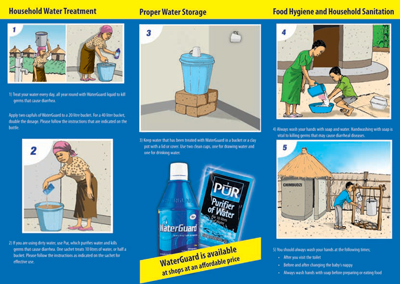 The main objectives are to prevent water related illnesses and other major causes of illness and death such as malaria and malnutrition, and to improve the economic well-being of the members of HIV support groups. SWAP’s strategies are to use already existing community structures and enhance their capabilities through training, access to inexpensive, proven health products, consultation, and collaboration. The self-help groups receive training in health topics, running a small business, and receiving and managing microcredit. In addition, to improve their ability to motivate their friends and neighbors to improve their health, self-help group members are provided training in the Education through Listening (ETL) behavior change methodology based on motivational interviewing, stages of change theory, and social learning theory. ETL is a community engagement technique that is a person centered way of communicating and giving feedback to promote behavioral change.
The main objectives are to prevent water related illnesses and other major causes of illness and death such as malaria and malnutrition, and to improve the economic well-being of the members of HIV support groups. SWAP’s strategies are to use already existing community structures and enhance their capabilities through training, access to inexpensive, proven health products, consultation, and collaboration. The self-help groups receive training in health topics, running a small business, and receiving and managing microcredit. In addition, to improve their ability to motivate their friends and neighbors to improve their health, self-help group members are provided training in the Education through Listening (ETL) behavior change methodology based on motivational interviewing, stages of change theory, and social learning theory. ETL is a community engagement technique that is a person centered way of communicating and giving feedback to promote behavioral change.
>> More information about the Safe Water and AIDS Project [ – 117 KB]
– 117 KB]
>> SWAP website
National Urban Water Awards Programme: Catalyzing Change for Continuous and Equitable Water Supply and Universal Sanitation in Urban India
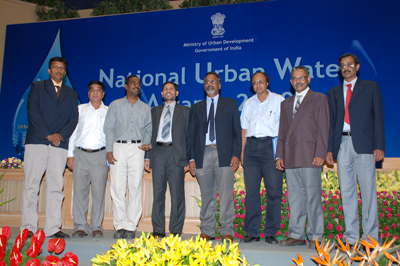 This programme was established in the year 2008 for the first time and aimed to encourage and promote provision of continuous and equitable water supply and universal sanitation in urban India. The Awards are meant to recognize
urban local governments for good performance in water and sanitation in seven themes, i.e. (i)Technical innovation, (ii) Financial reforms, (iii) Services to the poor, (iv) Citizen services and governance, (v) Public private partnerships, (vi) Urban sanitation and (vii) Communication and awareness generation.
This programme was established in the year 2008 for the first time and aimed to encourage and promote provision of continuous and equitable water supply and universal sanitation in urban India. The Awards are meant to recognize
urban local governments for good performance in water and sanitation in seven themes, i.e. (i)Technical innovation, (ii) Financial reforms, (iii) Services to the poor, (iv) Citizen services and governance, (v) Public private partnerships, (vi) Urban sanitation and (vii) Communication and awareness generation.
The Awards Programme is unprecedented in scale and scope, being open to around 4500 urban local governments/service delivery agencies across the country. The Awards Programme is now in its third year. The Awards Programme which is conducted jointly by the Administrative Staff College of India and the Ministry of Urban Development, Government of India.
The winners of the Awards are determined through a competitive and independent evaluation process including field validation and face to face presentations by the applicants. The Awards Programme was conceptualized based on the appreciation of the potential of learning from peers and knowledge exchange of context specific practice. Following the initial success of the programme, the nominee advocated successfully that the Programme be owned and driven by the Government after the initial success. It has been possible to reach out to over 4500 local governments, 28 state and seven union territories’ governments with knowledge of good practices emerging from the Programme.
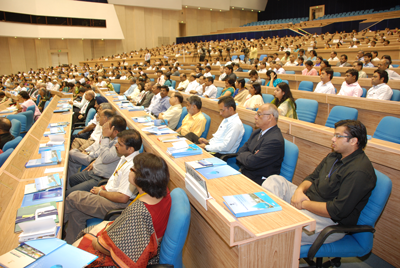 The Awards have enhanced the profile of water and sanitation agenda nationally and evoked increasing response proving to be a real-time and dynamic show case of achievements in the sector and inspiring other local governments to emulate the good practices learnt thus. The Awards Programme has also resulted in the measurement of quantitative and qualitative progress made by water and sanitation service delivery agencies, making them both accountable and competitive to deliver better services due to a non monetary motivation. The success of the Programme has led the Government of India to integrate the Programme in the National Five Year Plan.
The Awards have enhanced the profile of water and sanitation agenda nationally and evoked increasing response proving to be a real-time and dynamic show case of achievements in the sector and inspiring other local governments to emulate the good practices learnt thus. The Awards Programme has also resulted in the measurement of quantitative and qualitative progress made by water and sanitation service delivery agencies, making them both accountable and competitive to deliver better services due to a non monetary motivation. The success of the Programme has led the Government of India to integrate the Programme in the National Five Year Plan.
>> More information about the National Urban Water Awards Programme [ – 44 KB]
– 44 KB]
>> National Urban Water Awards Programme website
>> FAQs
>> Statutes
>> Categories
>> Chinese![]()
>> English![]()
>> French![]()
>> Spanish![]()
>> By numbers
>> Candidates
>> Evaluation committee
>> Selection committee
>> Finalists
>> Winners
>> Ceremony
>> By numbers
>> Candidates
>> Evaluation committee
>> Selection committee
>> Finalists
>> Winners
>> Ceremony
>> By numbers
>> Candidates
>> Evaluation committee
>> Selection committee
>> Finalists
>> Winners
>> Ceremony
>> By numbers
>> Candidates
>> Evaluation committee
>> Selection committee
>> Finalists
>> Winners
>> Ceremony
>> By numbers
>> Evaluation committee
>> Selection committee
>> Candidates
>> Finalists
>> Winners
>> Ceremony
Copyright | Terms of use | Privacy notice | Site Index | Fraud alert | Help





